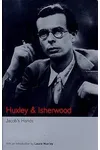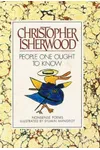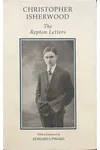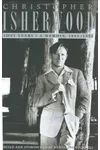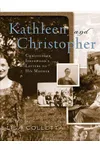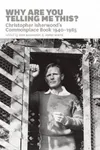Picture an English storyteller who captured the vibrant, chaotic soul of pre-war Berlin, inspiring a musical sensation—meet Christopher Isherwood! Born in 1904, this novelist and playwright wove tales of love, identity, and societal upheaval, becoming a literary icon and a pioneer of gay literature. His sharp prose and fearless exploration of human connection still resonate today.
From England’s countryside to Berlin’s cabarets and Hollywood’s glitz, Isherwood’s life was as colorful as his stories. His work, especially The Berlin Stories, not only painted vivid portraits of a world on the brink but also broke ground for LGBTQ+ voices in literature. Ready to dive into his world?
The Making of Christopher Isherwood
Christopher William Bradshaw Isherwood was born on August 26, 1904, in Cheshire, England, into a well-off family. After his father’s death in World War I, young Christopher found solace in literature, studying at Cambridge University but leaving without a degree to chase his writing dreams. His early years were shaped by rebellion against England’s stuffy norms and a thirst for adventure, leading him to Berlin in 1929, where the city’s liberal spirit and underground nightlife sparked his creativity.
In Berlin, Isherwood befriended poets like W.H. Auden and soaked up the city’s eclectic culture. This vibrant backdrop, coupled with his own exploration of his identity as a gay man, fueled his early novels and set the stage for his literary legacy.
Christopher Isherwood’s Unforgettable Stories
Isherwood’s most famous work, The Berlin Stories (1945), is a semi-autobiographical collection of two novellas: Mr. Norris Changes Trains and Goodbye to Berlin. These stories capture 1930s Berlin’s decadence and looming political tension through characters like the iconic Sally Bowles, later immortalized in the musical Cabaret. His clear, almost journalistic prose brought readers into smoky cabarets and tense political undercurrents, blending humor with heartbreak.
Other notable works include A Single Man (1964), a poignant novel about a gay professor’s day of grief and quiet resilience, hailed as a landmark in queer literature. Prater Violet (1945) reflects his Hollywood years, exploring art and exile, while Christopher and His Kind (1976) offers a candid memoir of his life and loves. Isherwood’s style—witty, intimate, and unflinchingly honest—made his stories universal yet deeply personal.
His themes often circled identity, freedom, and the search for meaning in turbulent times. Whether depicting Berlin’s fleeting joys or the quiet dignity of love, Isherwood’s work challenged societal norms and celebrated human complexity.
Why Christopher Isherwood Matters
Isherwood’s influence stretches far beyond his pages. By centering gay characters and experiences at a time when such stories were taboo, he paved the way for modern queer literature. His vivid portrayal of Berlin inspired countless adaptations, from Cabaret to films, cementing his cultural impact. His later years in California, where he embraced Vedanta philosophy and mentored young writers, showed his commitment to personal and artistic growth.
Today, Isherwood’s work remains a beacon for readers seeking stories of authenticity and resilience. His ability to capture both the sparkle and shadow of human life ensures his place as a literary trailblazer.
- Born: August 26, 1904, Cheshire, England
- Key Works: The Berlin Stories, A Single Man, Christopher and His Kind
- Notable Adaptation: Cabaret (1966 musical, 1972 film)
- Died: January 4, 1986, Santa Monica, California
Snag A Single Man or The Berlin Stories and dive into Isherwood’s witty, soulful world!












